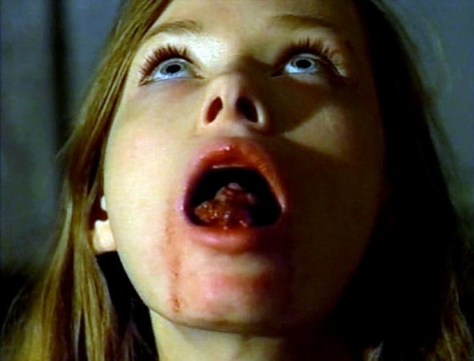
Seen at L’Étrange Festival, Paris (France)
Format: Cinema
Release date: 7 April 2017
Distributor: Universal
Director: Julia Ducournau
Writer: Julia Ducournau
Cast: Garance Marillier, Ella Rumpf, Rabah Nait Oufella
Original title: Grave
France 2016
95 mins
Julia Ducournau’s technically masterful female-focused cannibal film is less insightful than it may seem.
A girl walks alone at dawn, alongside a deserted country road. When a car drives by, she dives underneath it, causing the car to crash into a tree. The driver is dead and the girl leans over the car door to examine him. Here we are, then, revisiting David Cronenberg’s Crash, one might be tempted to think. Yet we soon find out that, if Julia Ducournau’s first feature film – selected for the Cannes Critics’ Week 2016 – definitely pays tribute to the ‘baron of blood’, it is most indebted to his recent novel Consumed. (Incidentally, let it be said that the English title makes the film’s cannibalistic turn evident from the start.) Cronenberg makes a perfect and duly acknowledged tutelary figure for the 32-year-old French director, who must have been fed pithy anecdotes from dissecting tables and emergency wards in her early days by her dermatologist father and gynaecologist mother. This might partly account for Ducournau’s obsession with the transformation of bodies, already omnipresent in her short film Junior (2011) and in her TV film Mange (2012). Junior actress Garance Marillier – now come of age and confirming her talent – is entrusted with the main role of Justine, who joins her elder sister Alexia (Ella Rumpf) for her first year in a veterinary school. During the unavoidable fresher initiation ritual (and in France medical schools are known to be the most gruesome), vegetarian Justine is forced to swallow a raw rabbit kidney, which, after an allergic reaction, triggers a novel taste for meat. A bikini-line depilation accident transforms this taste into a craving for human flesh, which actually runs in the family, as Alexia turns out to be ‘crash’ girl, eating her victims’ spare parts.
Although at first sight, Ducournau seems to be using the horror genre as a vehicle for a reflection on the passage to adulthood, the film is rather short on social or psychological insights, while the plot and the characters seem half-baked. In fact, Ducournau indulges in a sensationalist exploitation of the theme and the wide range of unpalatable reactions it provokes. This was clearly confirmed when she presented her film at the Etrange Festival, and evidently relished retelling the pungent anecdote from the Toronto Film Festival where paramedics had to be called during the screening to assist a spectator who had found the film hard to stomach. Thus, inscribed within the horror genre, Raw rather self-consciously plays with its codes, safe within its boundaries and often verging on parody. Ducournau delivers an efficient and technically mastered (but one would not expect less from a Fémis graduate) variation on the cannibal flick, which manages to keep a few twists in store alongside the more expected final feast. Ducournau was one of the 30 people on The Alice Initiative 2016 list, which aims to boost the number of female directors. Let us hope she gives us more fat to chew on in the years to come.
Pierre Kapitaniak





